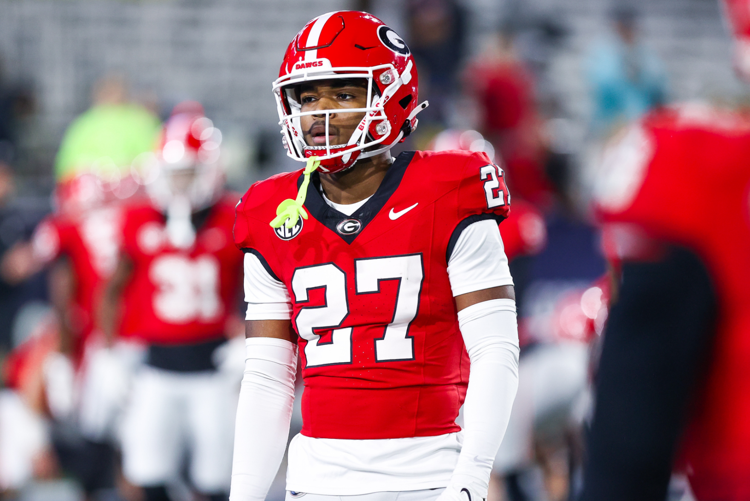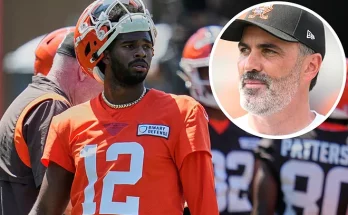Georgia Bulldogs defensive back Chris Peal has officially entered the NCAA transfer portal, signaling the end of his tenure in Athens and opening the door for a new chapter elsewhere in college football. The former 4-star recruit out of Charlotte, North Carolina, departs a program that has been one of the nation’s most dominant forces in recent years under head coach Kirby Smart. Peal’s decision reflects a growing trend in college football, as players seek opportunities for increased playing time, fresh starts, or better fits in schemes that match their skills and aspirations.
Peal, who signed with Georgia as part of the 2023 recruiting class, came into Athens with considerable expectations. A standout at Providence Day School, he was rated as one of the top cornerback prospects in the Southeast and earned a reputation for his blend of speed, coverage instincts, and positional versatility. Georgia beat out schools like North Carolina, Michigan, and Tennessee for his services, a testament to the talent and upside Peal possessed coming out of high school.
Despite his potential and pedigree, Peal found playing time difficult to come by in Georgia’s loaded secondary. The Bulldogs have become known for producing elite defensive backs, and the depth chart at both cornerback and safety was packed with former blue-chip prospects and proven veterans. As a result, Peal primarily contributed in practice and saw limited in-game action during his redshirt freshman season. His time on the field may not have matched his expectations, but it provided valuable experience within one of the nation’s most competitive environments.
By entering the portal, Peal joins a long list of former top recruits looking to reestablish their careers with a fresh opportunity. The transfer portal era has transformed the landscape of college football, empowering players to take more control over their development and visibility. For a player like Peal, who still possesses significant upside and multiple years of eligibility remaining, the move could prove to be a pivotal turning point.
Peal’s decision also reflects the increasingly competitive nature of the Georgia program. Since winning back-to-back national championships in 2021 and 2022, the Bulldogs have continued to recruit at an elite level, restocking their roster with high-caliber talent on an annual basis. This relentless influx of prospects has made it exceptionally difficult for young players to break into the rotation, especially in the defensive backfield, where Kirby Smart and co-defensive coordinator Will Muschamp have cultivated a pipeline to the NFL.
It’s worth noting that Peal was highly regarded internally for his work ethic and team-first mentality. Coaches spoke positively about his growth behind the scenes, his adaptability, and his willingness to embrace a developmental role despite the obvious challenges. In a locker room filled with stars and NFL hopefuls, Peal held his own and contributed to the team’s culture of accountability and toughness.
Still, the writing may have been on the wall entering the spring. With a new crop of defensive backs arriving on campus—both from the high school ranks and potentially via the transfer portal—the path to meaningful playing time may have become even narrower. Spring practice gave Peal a chance to evaluate where he stood, and after assessing his role and future within the program, he opted to explore other options.
From a technical standpoint, Peal’s skill set remains enticing. At 6-foot and just over 180 pounds, he has the physical tools to compete at the Power Five level. He possesses quick feet, fluid hips, and solid instincts in both man and zone coverage. Additionally, he brings experience on special teams and could be a valuable rotational piece or even a starter at another school depending on fit and opportunity.
While his departure may not shake the foundation of Georgia’s defense, it does represent a minor loss in depth and developmental potential. The Bulldogs have the luxury of reloading with elite talent, but players like Peal often blossom into key contributors elsewhere once given the stage to shine. For that reason, many schools are likely to express interest in acquiring a player with his background and remaining eligibility.
Peal’s journey also highlights a broader trend in college football—one where player movement is not only accepted but expected. The days of signing with a program and staying there for four or five years are increasingly rare. Modern athletes are more proactive in managing their careers, and the portal provides a mechanism to pivot when necessary. This mobility creates both opportunities and challenges, as coaches must constantly balance retention with recruitment, development with immediate production.
For Peal, this decision marks the beginning of a new phase in his football life. Whether he lands at a Group of Five school where he can become an instant starter, or at another Power Five program seeking help in the secondary, the move offers him a chance to reset, refocus, and reassert his value. Given his experience in one of the most demanding defensive systems in the country, he will bring a level of preparation and discipline that should serve him well wherever he goes.
From a recruiting standpoint, Peal’s entry into the portal will attract a wide range of interest. Teams with needs at cornerback or safety will be eager to bring in a player who has practiced against elite competition daily. Schools in the ACC, Big 12, and even the Big Ten could be in the mix, especially those that missed out on similar targets in previous cycles or who need depth in the defensive backfield.
While fans may be disappointed to see a player like Peal move on, it’s important to recognize the context. Georgia’s program is in a unique position—it develops talent at a high level but also creates logjams at certain positions due to its recruiting success. Not every player can rise to the top in such an environment, and for many, the best decision is to find a new setting where their talents can be more fully realized.
Chris Peal’s story is far from over. If anything, it’s just getting started. The transfer portal will offer him a platform to write the next chapter, one where he can step onto the field with the confidence of someone who has sharpened his tools at one of the sport’s premier institutions. He leaves Georgia with the benefit of having trained under one of the best coaching staffs in the country, and that foundation should make him a valuable asset to his next team.
In the coming weeks, Peal will likely field calls and host visits as programs look to finalize their rosters ahead of the 2025 season. It won’t be long before he finds a new home, puts on a new jersey, and begins to show what he’s capable of when given the opportunity. His story is one that resonates with many players across the country—talented, motivated, and simply looking for the right fit.
Meanwhile, Georgia will continue to operate as it always has—developing the next wave of stars and pursuing championships. For Kirby Smart and his staff, the focus remains on competition and excellence, and the emergence of new talent will undoubtedly continue. But for now, Chris Peal’s exit is a reminder of the human side of college football—the individual paths, the dreams pursued, the risks taken, and the relentless search for the right place to grow.
In a sport constantly in motion, Peal’s move is both a personal decision and a reflection of the broader evolution of the college football ecosystem. What lies ahead for him will depend on the choices he makes, the opportunities he seizes, and the lessons he carries from his time in Athens. Wherever he lands, expect Chris Peal to compete with the same determination that made him a Bulldog in the first place.



